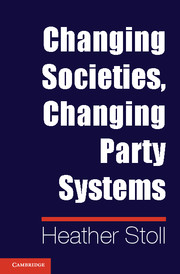Book contents
- Frontmatter
- Contents
- List of Tables
- List of Figures
- Acknowledgments
- 1 Introduction
- 2 Social Heterogeneity and the Number of Parties: A Theory
- 3 Describing Social Heterogeneity: Measures and Testable Hypotheses
- 4 Social Heterogeneity and Party System Fragmentation: Empirical Evidence across Space and Time
- 5 Israel: New Parties for New Groups?
- 6 Israel: Testing Hypotheses about Sectarian Party Success
- 7 The United States: New Parties for New Groups? Testing Hypotheses
- 8 Conclusion: Party System Fragmentation and Beyond
- A Additional Material for the Quantitative Analyses in Chapter 4
- B Demography in Israel
- C Sephardi and Russian Sectarian Parties and Their Success in Israel
- D Demography and the Franchise in the United States
- E African American Descriptive Representation in the United States
- Bibliography
- Index
2 - Social Heterogeneity and the Number of Parties: A Theory
Published online by Cambridge University Press: 05 June 2014
- Frontmatter
- Contents
- List of Tables
- List of Figures
- Acknowledgments
- 1 Introduction
- 2 Social Heterogeneity and the Number of Parties: A Theory
- 3 Describing Social Heterogeneity: Measures and Testable Hypotheses
- 4 Social Heterogeneity and Party System Fragmentation: Empirical Evidence across Space and Time
- 5 Israel: New Parties for New Groups?
- 6 Israel: Testing Hypotheses about Sectarian Party Success
- 7 The United States: New Parties for New Groups? Testing Hypotheses
- 8 Conclusion: Party System Fragmentation and Beyond
- A Additional Material for the Quantitative Analyses in Chapter 4
- B Demography in Israel
- C Sephardi and Russian Sectarian Parties and Their Success in Israel
- D Demography and the Franchise in the United States
- E African American Descriptive Representation in the United States
- Bibliography
- Index
Summary
In this chapter, I develop a theory about how changes in the heterogeneity of society affect one important facet of democratic party systems: the number of political parties. For both normative and practical reasons, this relationship has been the primary focus of the literature seeking to link society to the party system. Yet more specifically, my goal in this chapter is to grapple with the question of whether new groups of citizens added to democratic societies by processes such as extensions of the franchise successfully form their own sectarian political parties, and why. These are newly formed political parties that seek to represent new social groups to the exclusion of other groups.
Drawing from the existing literature, I argue that the electoral system has an important role to play in this process. But I also argue that our explanatory leverage is greatly increased if we take into account several additional variables. Focusing on the electoral system alone leaves us unable to explain whether sectarian parties will successfully emerge to represent new social groups in most real-world situations. As I will argue in a later chapter, an example is Israel, where some groups of Jewish immigrants have successfully obtained sectarian representation but others have not. Moreover, both the existence and the electoral success of sectarian parties seeking to represent these new social groups in Israel have varied over time. Yet Israel has had an extremely proportional electoral system throughout its history, which means that the electoral system cannot help us to explain the outcomes of the Israeli case.
Information
- Type
- Chapter
- Information
- Changing Societies, Changing Party Systems , pp. 22 - 58Publisher: Cambridge University PressPrint publication year: 2013
